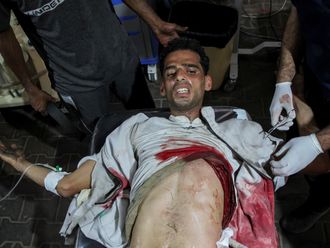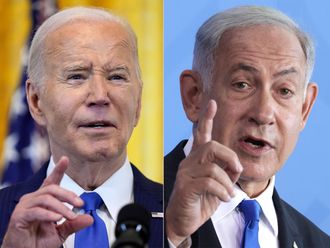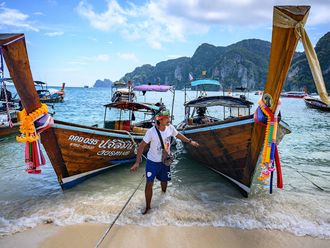Dubai: When I first arrived in Cairo to cover the pro-democracy protests, I was concerned about not having brought anything that would clearly distinguish me as a journalist. With only my Gulf News identity card hanging around my neck, I thought I would be safer if I clearly stood out as a journalist.
How wrong I was.
I was staying at the Ramses Hilton on the Nile cornice. The hotel, about 500 metres from Tahrir Square, served as the makeshift Cairo bureau for hundreds of journalists from around the world.
Being on my own in Egypt and almost coming under the fire of a drive-by shooting once, I would wait below the Ramses Hilton for other journalists heading to the square. They would be glad to have me walk with them, and I would often return the favour by translating for them if confronted by the army or armed thugs on the way.
Being seen with Western journalists, however, eventually became a liability. I was told that I could easily pass as an Egyptian, but Westerners I shared taxis with would be told to keep their heads down for the entire duration of the ride. I eventually began to move around downtown Cairo on my own when I became familiar with sensitivities.
After the clashes of February 2 between anti-regime and pro-regime protesters, I realised that being a journalist itself was becoming a liability. I saw a Western journalist being chased by an angry armed mob from atop a bridge while the battles were raging below, and heard reports about other journalists being stabbed, kicked, even sexually intimidated. It was only the next morning that I realised how many had been hurt, as journalists with bandaged heads casually selected their buffet breakfast.
Having to walk every day through what had become pro-Mubarak territory, I would often be asked if I was from Al Jazeera, or whether I was Palestinian. Al Jazeera is conspiring against Egypt, and many of its reporters are Palestinian, one pro-Mubarak thug told me.
Coming from a largely neutral Arab country however got me far, and exceptions were made for me as an Omani where no one else got them, with the army and with angry pro-Mubarak protesters.
At army road blocks, where even elderly, politically passive Egyptians and Western journalists were prevented from crossing, I was often allowed, with a broad smile, to pass after showing my government identification. Say hello to the Sultan, I was told time and again by the soldiers and civilians.
The violent activity eventually spread close to the hotel’s doorstep. Some of the battles between the pro- and anti-regime groups took place directly outside the hotel, and many of pro-regime gangs, armed with sticks and often knives, lingered around the hotel, keeping a close eye on the journalists.
The sound of gunshots being fired close to the hotel became common. At one point, the shots were fired from such close proximity that I had to switch off my room lights and sit on the floor until the situation calmed down. It got the sense that everyone was responsible for their own security. With the police having been withdrawn from the streets and the army playing a passive role, no one could be trusted to keep anyone else safe.
On Thursday, February 4, the tanks that had been seemingly guarding the hotel disappeared. Late in the afternoon, I was on the balcony of my twelfth floor hotel room doing a radio report when I was informed that pro-regime gangs had entered the hotel and were on a witch hunt for journalists.
A colleague called immediately, saying I should hide any proof of my being a journalist, put on a dishdasha and pop a can of beer in order to appear to be a Gulf tourist. I hung up, switched off the lights, muted the television and my phone, and hid all my money and anything that would give me away as a journalist, under the mattress.
The ticker on the muted news channel ran updates about the gangs trying to enter the hotel. I quietly waited for developments as I thought of a story to tell the thugs if they eventually made their way into my room.
A tense half an hour passed. I called the lobby and was ensured that the hotel was secure. I breathed a sigh of relief and switched the lights back on. Five minutes later, two pieces of paper were slipped under the door: emergency evacuation procedures and new regulations for journalists. Journalists, from then on, were not allowed to film from the hotel, name the hotel in their reports or interview any of its guests or staff. Other measures taken by the hotel included blocking elevator access to all the floors from the lobby.
It became apparent later that the gangs had tried to enter the hotel but were assured by the staff that journalist activity would be curbed. A source with contacts in the Egyptian military later told me that some of the gang members had even threatened to burn down the hotel. I have not been able to confirm this. The next day, the tanks returned to their former positions outside the hotel.
The taxi ride to the airport on Friday, February 4, cost me 300 Egyptian Pounds. The driver told me he was offered $100 by Western journalists for a ride to the airport during curfew hours but rejected it. It’s just not worth the risk, he said. The situation of Western journalists was significantly more difficult than that of Arab journalists. No one wanted to associate with Westerners.
As some major roads in downtown Cairo were closed by the military with pro-democracy protesters converging upon Tahrir Square for the second million-man march, we had to take inside roads going through poor neighbourhoods.
The driver read the Quran under his breath as we passed through the poor areas. Every few minutes he would ask if I had any cameras in my suitcase. Just an hour ago another taxi driver had his cars windscreen smashed by members of neighbourhood committees, for taking journalists. They pulled the journalists out and beat them, he said.
Youth committees were set up to protects neighbourhoods from looters and thugs, but as rumours spread around Cairo about a media conspiracy against Egypt, the committees too became hostile to journalists.
We planned a story to tell the committee members if caught, and went through minor made-up details that could be corroborated were we to be questioned separately.
Fortunately, we were not searched at a single check point. What saved us was a dead man. We happened to be driving behind a funeral procession which was exempted from searches. At every check point the driver lied, saying we were with the procession. This man saved us. May God grant him heaven, he said.











